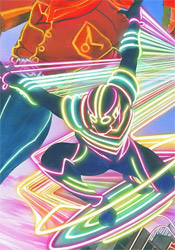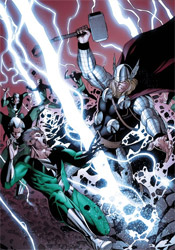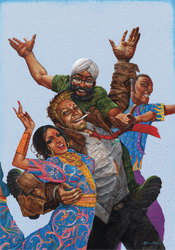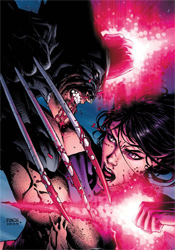
More than most of its predecessors, The Dark Age takes a look at the close relationship between the mood and social climate of the outside world and the direction of the comics that were published at the time. The 1980s weren't just a dark time for the superhero population, they were a decade of widespread distrust, of secret wars. The "peace, love and understanding" mood of twenty years earlier had slowly crumbled into a dark, hopeless era of commercialism and political helplessness. Busiek nails down that recollection early in the issue via a series of narration boxes that we'll later learn belong to Charles and Royal Williams, the focal points of this maxi-series.
Noting the rise of a darker, more violent style of hero, the displaced brothers see these signs of the times as a personal call to arms. Stewing for years over the murder of their parents, the pair have decided to join the dark movement, donning matching costumes and hunting down the man they hold responsible. Having missed the preceding thirteen issues, I figured this might be a tricky spot to just drop right into the action. And while there were a few moments where I felt overwhelmed, the basic ideas were easy to grasp and the action itself wasn't so fully invested in what had come before that I couldn't figure it out for myself. Busiek does like to lather the page with a good amount of text, but his concepts are never too high and his writing moves quickly enough that it's never more than a faint distraction.
Brent Anderson, an old pro who's been on-board Astro City since the start, brings along a visual style that's starting to look a bit dated but is still something to appreciate. His old school sensibilities are most appropriate in this arc, which is set right around the same time he enjoyed his first mainstream success in the real world with Ka-Zar and The X-Men. Anderson's style isn't especially flashy or energetic, but he makes up for it with strong, legible compositions and a master's knowledge of effective facial expression and body language. It probably isn't something you'll enjoy right out of the gates, but after a few issues I found myself really starting to appreciate his technique.
As something of a blowoff issue, I found this to be mildly lacking – everything seems to fall into place a bit too easily – but Busiek and company still have two issues to add some emphasis to the situation. As always with Astro City, this is something that would probably be better enjoyed in a trade paperback, but as a standalone issue it's nowhere near as intimidating as I'd expected. Very good but lacking a few key elements that would've made it great. Borrow it.
Overall Score: 7



